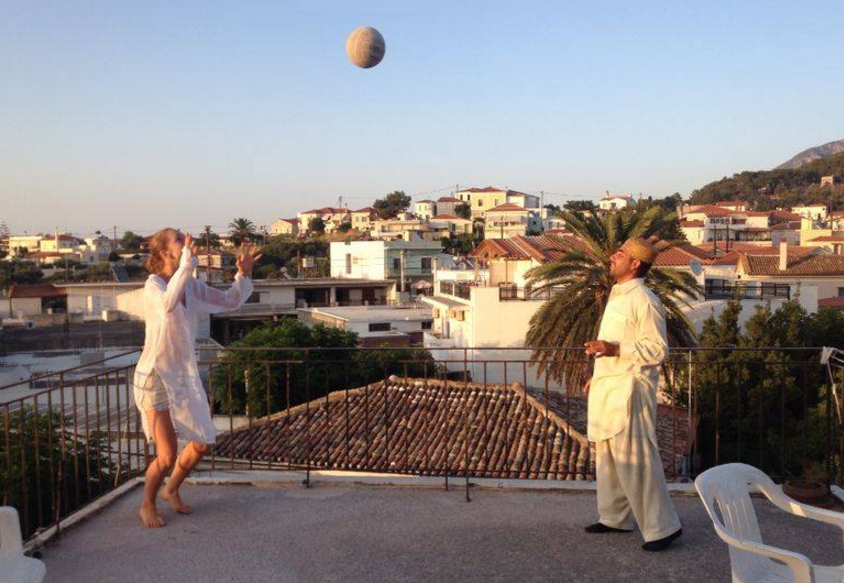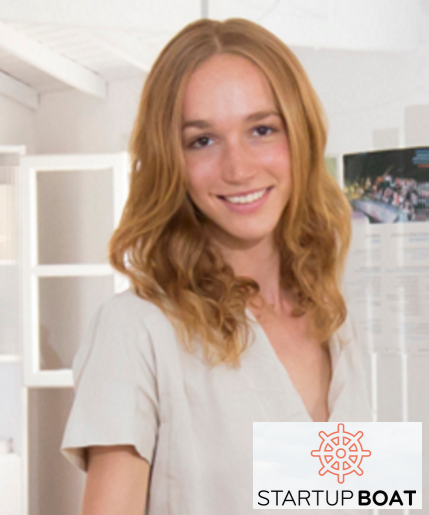This summer I visited Greece, where I sailed and worked with the people of Coboat, and where I met Paula Schwarz. Paula, born in Greece, living mostly in Berlin, spends a lot of time in Greece these days to help refugees and to create possibilities for the local population through the power of internet. She is the founder of Startupboat, a project that helps mobilising tech, business and social innovators to create solutions that change the frontline of migration. I interviewed her:
Who is Paula Schwarz? What is your life mission?
I am a passionate loser, an over-thinker who tries to connect the dots already looking forward. However, I also strongly believe in the fact that it’s important to look into the past. Culture is a gift and we should be thankful for it because it can allow us to learn lessons and to, hopefully, make different mistakes in the future.
My mission is to connect people from different fields, nationalities, genders and ages to achieve the best result for all.
I care about forming stability, and hopefully also sustainability for myself and those around me through inclusive, open-minded systems in which the intentions are clear and honest. My biggest passion is to identity individuals around me who have a strong sense of responsibility, who inspire me and who allow me to grow.
What can the tech community do to help refugees who are coming to Europe?
We need to address migration centered challenges using human centred design and also include the host communities as early as possible. Tech alone cannot be the answer. The people who use it should be at the center of the conversation. In Central Europe today we are seeing that people want to help Syrian refugees much, which is great. The refugee crisis provides the perfect excuse to introduce new measures such as digital banks, online universities, new farming techniques, languages courses and a rethinking of mobility and living in different regions of Europe and beyond. We need to conduct user-centered research and assess the needs with open minds – think differently. We need to talk to different people around us, find out who they are and what troubles them. Develop concepts, and mobilize the tech and startup community to implement them.
How could startups get involved? How to achieve a win-win situation?
Startups can do things such as to include refugees in their diverse teams, find out how to hire developers who are refugees, launch their product at special rates in a region it’s really needed in or lend team members out of their work force to projects that are in need of support. We work with a database of over 3.5k projects that deal with mass migration and would be happy to point to projects that are growing extremely quickly. A general rule for people who build tools is that it’s always best to create tools that solve a problem for both locals and newcomers so that both sides can see migration as an opportunity rather than a challenge. Investors can reach out to support outstanding individuals around them who seem to have potential by mentoring them and, if the prospective entrepreneur delivers promising results they could even consider to help them found a company! I have done that a couple of times and it has enriched me with new friends and great learnings. Right now I am backing my friend Nada who was chosen to represent Egypt at the One Young World Conference. Newcomers obviously need to create a new network of partners, friends, lawyers, teachers…
What are other European projects where entrepreneurs can help refugees?
Migration Hub Network… this is a free co-working space that hosts change makers around the European refugee crisis and currently operates in 7 different cities. You can go visit change makers, connect to different players in the public and private sector and find out what’s happening in the scene. Rocket Internet recently hired a bunch of developers for their different ventures. I think this is brilliant and should be supported, particularly because the company builder had gotten a lot of press lately. Tawila.org is our latest partner – they provide toolkits for groups and companies to want to create possibilities to hire refugees. Their team is very experienced and calm – entrepreneurs who start projects around the refugee crisis need to know how to keep things going under extreme conditions in this crisis.
How exactly are you helping in Samos, the Greek iceland just next to Turkey?
Samos is the birthplace of Pythagoras, it is also where his first school was located. We basically try to bring the arts and technology back to where they came from, and to connect people from around the world at a place where they can learn, rest and work. We are currently 20 people here who are building a collaborative space, a Pythagoras Academy, to bring the island from offline to online through the use of design thinking and new approaches to community building. In the center of the project is a Migration Hub for change makers who work around mass migration, a museum where art courses will be given throughout the winter months for both locals and newcomers and a music room, where pieces can be recorded officially so that we can hold to them for the long run. Many of the spaces we use have been made available to us by the local municipality or by my family. My mother built a museum on the island and we have started to work together a lot in order to support each other and reach the highest possible impact that be achieved. We also push both locals and refugees to start courses at a new online university that is soon to be launched in the region in partnership with the local state university. Our doings are backed by expat Greeks from around the world who support the cause, for example the founder of Korres products, my mother Chiona Xanthopoulou and the daughter of Vicky Leandros.
Could you recommend our readers one or two books that helped you during your entrepreneurial endeavors?
I would suggest the ‘The New Odyssey: The Story of Europe’s Refugee Crisis’ by Patrick Kingsley. Also, this TED Talk kept me going. It’s called ‘The Art of Stillness’ and deals with how your state of mind influences your perception of your journey. Super useful material for every entrepreneur & traveller.
Kilian Kleinschmidt is a friend and supporter – I suggest reading one of his books also to get a glimpse into the life of someone who used to run a refugee camp.





